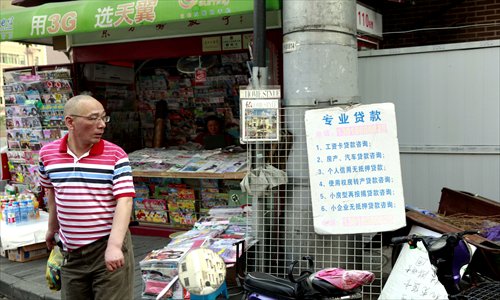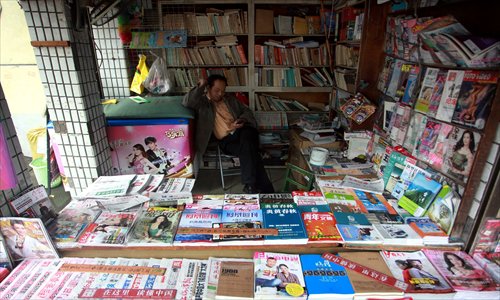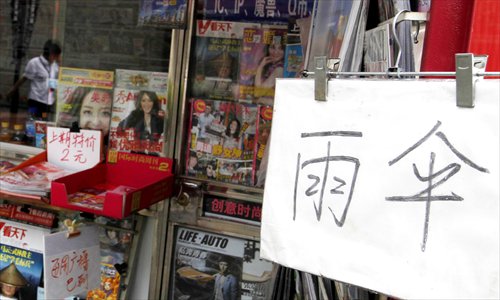Running out of print

As business becomes sluggish, some newsstands are displaying large posters, like this one advertising mortgage deals, to make extra money. Photo: Yang Hui/GT
They are a colorful feature of Shanghai streets and last year the Communist Party of China newspaper Guangming Daily said that newsstands should never disappear. The influential newspaper, which was founded in 1949 and carried writings by Chinese leaders including Mao Zedong and Zhou Enlai, claimed that newsstands should not be allowed to vanish because they shouldered important responsibilities in spreading government policies, scientific knowledge and information.
But if the newspaper really wants to preserve newsstands, it might have to persuade governments to take some action. The attractive kiosks that have sold newspapers and magazines to thousands of commuters every day are now facing a struggle to survive.
They might still look busy at peak hours as train and bus travelers grab their newspapers or reading material for the journey, but the economics of newspaper and magazine selling are changing.
Several kiosk owners have told the Global Times that business has slumped by 20 to 50 percent in the past two years. Some kiosks have been abandoned while other kiosk owners try to supplement the basic trade by selling a variety of other goods.
At 9 am on a Monday morning inside his newsstand on Lingshi Road in Zhabei district, 57-year-old Zhou Ronghua, wearing a faded gray T-shirt and shorts, is having a break after the rush hour. Rows of the latest newspapers and magazines are spread before him on his counter and at his side a notebook screen displays the state of the stock market.

This newsstand proprietor has little to do during the day as business has dropped off. Photo: Yang Hui/GT
Tabloids and scandal
The major newspapers, Shanghai Morning Post, Oriental Morning Post, Global Times' Chinese edition and the Reference News share space with colorful scandal-loving tabloids.
Zhou is not as busy as he used to be, he told the Global Times. Business has been sluggish since last year. "Nowadays, few people buy newspapers. Over a day, I sell about 50 editions each of Shanghai Morning Post, Xinmin Evening News and Reference News, but that's a third fewer than before.
"Almost all my current customers are middle-aged," Zhou said. "They are too old to give up their newspaper reading habits. Young people are relying more and more on the Internet. They are used to reading on smartphones and mobile devices. Only a few young people come here and they usually want to buy sports papers. Older people enjoy metropolitan newspapers, political affairs and the tabloids."
Zhou is not the only newsstand owner troubled by declining business. A middle-aged woman, who runs a stand near the Jade Buddha Temple in Putuo district, told the Global Times that newspaper sales had decreased by half this year and magazines were even worse. "Fewer and fewer young people buy newspapers. Last year I was selling 50 to 60 copies of Shanghai Morning Post each day, but this year I can barely sell 30," she said.
Zhou has run the business for over a decade. When his kiosk opened in 1999, he made between 1,500 yuan ($245.11) and 1,800 yuan a month. In July this year, he made 2,100 yuan. "It sounds as if I am making more money, but I am making a lot less when you consider inflation."
Zhou's kiosk belongs to the city's largest newsstand chain, Shanghai Oriental Newsstands, a joint venture owned by China Post, the Wenhui-xinmin United Press Group, the Jiefang Daily Group and the Shanghai News and Press Bureau.
Newsstand proprietors like Zhou pay a deposit of several thousand yuan to run their kiosks. The company gives each chain newsstand a sales quota according to its location. If the proprietor meets the quota, he will be given a 14 percent commission on the turnover otherwise he takes an 8 percent commission.

This stand is now selling umbrellas as well as newspapers and magazines.Photo: Yang Hui/GT
Not competitive
The kiosks get their newspapers and magazines from the company's distribution center. Zhou's monthly sales quota is 6,000 yuan and he has always managed to make this but he says today this is not a competitive wage.
"Because I will retire in a few years and my previous employer covers my pension and welfare, I can be satisfied making 2,000 yuan a month. But it's not enough to support the lifestyles of young people or those who have to pay welfare insurance by themselves, not to mention the long hours," Zhou said. He usually leaves home at 6 am and returns after 8 pm.
Another newsstand owner surnamed Ying runs a stand in the Shanghai International Studies University in Hongkou district. This kiosk is part of a different chain, Education Newsstands, and Ying told the Global Times that he is losing money selling magazines and newspapers. "The income doesn't cover the wages I have to pay for my two employees, electricity and water bills and rent."
Ying's newsstand has only six newspapers displayed on the counter alongside a range of foreign magazines. On shelves in the kiosk, there are playing cards, bottles of drinks and cigarettes for sale.
Ying remembers sadly the good days when he sold 100 copies of the weekly newspaper Shanghai Times. "In those days, I would be selling the papers as quickly as I unwrapped them from the deliverymen. People born before 1985 started reading newspapers in their childhood, but students nowadays read on the Internet. If they have the money, they will pay Internet subscriptions instead of buying newspapers because the Internet offers them more information and entertainment. "
Too hard to start
Ying said he continued to run his newsstand because, after 10 years, it was too hard to start a new business. "Otherwise I have practically given up. We have to open before 7 am and usually close after 8 pm every day, but I earn nothing like the sort of wages I could earn by working in an ordinary job."
Another newsstand owner surnamed Yu is almost ready to give up his business. His stand is on Weihai Road and he told the Global Times that he doesn't believe things will get better.
"I've been a newspaper vendor for 16 years. When I was starting out, I earned 4,000 to 5,000 yuan each month selling 300 copies of Shanghai Morning Post and Xinmin Evening News every day, but now I make only 3,000 yuan. The sales of these two popular newspapers is a 10th of what it used to be."
As business falls off, both the newsstand companies are trying new methods to keep afloat. Oriental Newsstands now allows its kiosk proprietors to sell bottled water. "The company sends us bottles and we can make 9 yuan on each box of 24," Zhou said.
His stand now offers toys, comics and notebooks on which he can make 20 percent profit. He also sells some of the independent Chinese tabloid newspapers. "Elderly people love these scandal sheets with stories about love affairs of politicians and celebrities and bizarre social events. Officially we can only sell the distribution company's magazines and newspapers. But since business is so bad, this is no longer strictly enforced."
At another newsstand on Chengdu Road North, the owner told the Global Times that downtown kiosk proprietors can also now make extra money by displaying large glossy posters for popular magazines. "Magazines that want to promote themselves pay us to display posters on the doors of the kiosks. They pay 50 yuan a month or sometimes hundreds of yuan for this."
Even though her newsstand is right next to a busy bus stop, her daily sales have dropped by half since last year. "Reading habits are changing and there are more online bookstores delivering magazines for less to the customers' homes. In the past, the distribution company didn't let us to sell anything except magazines, newspapers and phone cards. Now the company sends us bottled drinks and toys to help us make more money, but this isn't working well because there are too many convenience stores around," she said.
The owner added that many kiosks in the city are run by people who have been involved in the business for years. "It's not a good industry for beginners any more. We experienced vendors are used to the flexibility of this work and many of us are reluctant to get a job with ordinary restrictions. But many jobs in the city are offering more money."
A national problem
Shanghai newsstands are not the only ones in the country facing problems. The Xinhua News Agency recently reported that a large number of newsstands in Kunming, the capital of Yunnan Province, have been closed. One newsstand company which used to have 800 kiosks in the city now runs just 100. Figures from China Post show that between 2008 and 2012 more than 10,000 China Post newsstands closed throughout the country.
Shanghai's largest newsstand chain, Oriental Newsstands, now has 1,620 kiosks downtown. These stands sell Party newspapers, including People's Daily, Jiefang Daily, Wenhui Daily and Laodong Daily. They are also the official distribution points for municipal government gazettes.
When Oriental Newsstands started its kiosk network in 1999, it was then offering the kiosks to people who had been laid off work. Today some of the proprietors are subletting their stands and working elsewhere. The chain is looking at ways of improving business - in July last year it agreed to sell lottery tickets from its kiosks.
Last year, several members of the Shanghai Municipal Committee of the Chinese People's Political Consultative Conference raised the issues involving the city's newsstands at the annual meetings for the city's policymakers and policy advisors. In response, China Post announced that it planned to add services to newsstands like offering concert tickets and tickets for sporting events. Newsstands will also become more involved with residential communities and government departments.
Dai Lina is an associate research fellow at the Journalism Institute of the Shanghai Academy of Social Sciences and studies media marketing and new media. She said that the shrinking market for newsstands was directly related to the newspaper recession.
"Newsstands are facing great pressure. People are abandoning their old reading habits. But it's hard to say whether newsstands will vanish. We don't know whether the government might offer support."